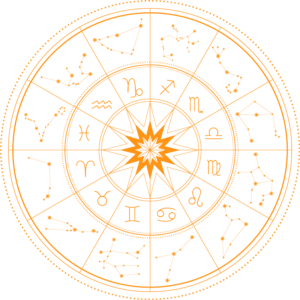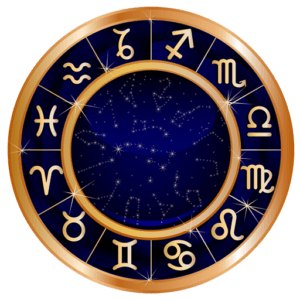
Astrology is a belief system and a pseudoscience that suggests a connection between the positions and movements of celestial bodies, such as planets and stars, and events and human affairs on Earth. It is based on the idea that the positions of these celestial bodies at the time of a person's birth can influence their personality, behavior, and even their destiny.
Key components of astrology include:
- Zodiac Signs: Astrology divides the sky into 12 sections or signs of the zodiac, each associated with specific personality traits and characteristics. These signs are Aries, Taurus, Gemini, Cancer, Leo, Virgo, Libra, Scorpio, Sagittarius, Capricorn, Aquarius, and Pisces.
- Birth Chart: An astrological birth chart, also known as a natal chart, is created based on the exact date, time, and place of a person's birth. This chart maps the positions of the Sun, Moon, planets, and other celestial bodies in relation to the zodiac signs and houses at the time of birth.
- Horoscopes: Astrologers create horoscopes by interpreting the positions and aspects (angular relationships) of celestial bodies in a birth chart. These horoscopes are often used to make predictions about a person's life, relationships, and future events.
about astrology:
- Houses: In addition to the zodiac signs, astrologers also consider the division of the birth chart into 12 houses. Each house represents a different aspect of life, such as career, relationships, home life, and more. The planets in a person's chart are said to influence these different areas of life.
- Sun Sign and Rising Sign: Most people are familiar with their "sun sign," which is determined by the position of the Sun at the time of their birth. However, astrology also considers the "rising sign" (or ascendant), which is the zodiac sign that was rising on the eastern horizon at the time of birth. Astrologers believe that the rising sign represents a person's outward behavior and how they appear to others.
- Astrological Compatibility: Astrology often includes the idea of compatibility between individuals based on their zodiac signs. For example, some people believe that certain signs are more compatible with others in romantic relationships, friendships, or business partnerships.
- Daily, Weekly, and Monthly Horoscopes: Many people read their horoscopes, which are brief astrological predictions based on the positions of celestial bodies. These are often published in newspapers, magazines, and online platforms and are meant to offer guidance or insight into one's day, week, or month.
It's important to approach astrology with a critical and open-minded perspective. While many individuals find personal meaning and insight in their astrological profiles, the scientific community widely regards astrology as a pseudoscience because it lacks empirical evidence to support its claims. People's personalities and life outcomes are influenced by a wide range of factors, including genetics, upbringing, environment, and personal choices, rather than the positions of celestial bodies at the time of their birth.

Certainly, here are some additional points related to astrology:
- Types of Astrology: There are various branches of astrology that focus on different aspects of life and use different techniques. Some well-known types of astrology include:
- Natal Astrology: This is the most common form of astrology, which involves creating a birth chart to provide insights into an individual's personality and life path.
- Mundane Astrology: This branch deals with predictions and analysis related to world events, politics, and global trends.
- Electional Astrology: It's used to determine the best times for important events like marriages, business ventures, and travel.
- Medical Astrology: This is the belief that the positions of celestial bodies can affect a person's health and well-being.
- Horary Astrology: In this form, astrologers answer specific questions based on the positions of celestial bodies at the time the question is asked.
- Astrological Symbols: Astrology uses a variety of symbols and glyphs to represent zodiac signs, planets, and other elements in a birth chart. For example, the symbol for the planet Venus is often used to represent love and beauty.
- Cultural Variations: Different cultures have their own astrological traditions. For instance, Western astrology, as mentioned earlier, is based on the zodiac system with 12 signs. In contrast, Vedic astrology, practiced in India, uses a sidereal zodiac with 12 signs as well, but it has its own unique interpretations and techniques.
- Skepticism and Criticism: Astrology has been heavily criticized by the scientific community for its lack of empirical evidence and predictive power. Studies attempting to find a scientific basis for astrological claims have largely failed to demonstrate its validity.
- Popularity: Despite the lack of scientific support, astrology remains popular and has a significant cultural influence. Many people read their horoscopes for entertainment, personal reflection, or as a way to seek guidance.
 Astrology is a belief system and a pseudoscience that suggests a connection between the positions and movements of celestial bodies, such as planets and stars, and events and human affairs on Earth. It is based on the idea that the positions of these celestial bodies at the time of a person's birth can influence their personality, behavior, and even their destiny.
Key components of astrology include:
Astrology is a belief system and a pseudoscience that suggests a connection between the positions and movements of celestial bodies, such as planets and stars, and events and human affairs on Earth. It is based on the idea that the positions of these celestial bodies at the time of a person's birth can influence their personality, behavior, and even their destiny.
Key components of astrology include:


